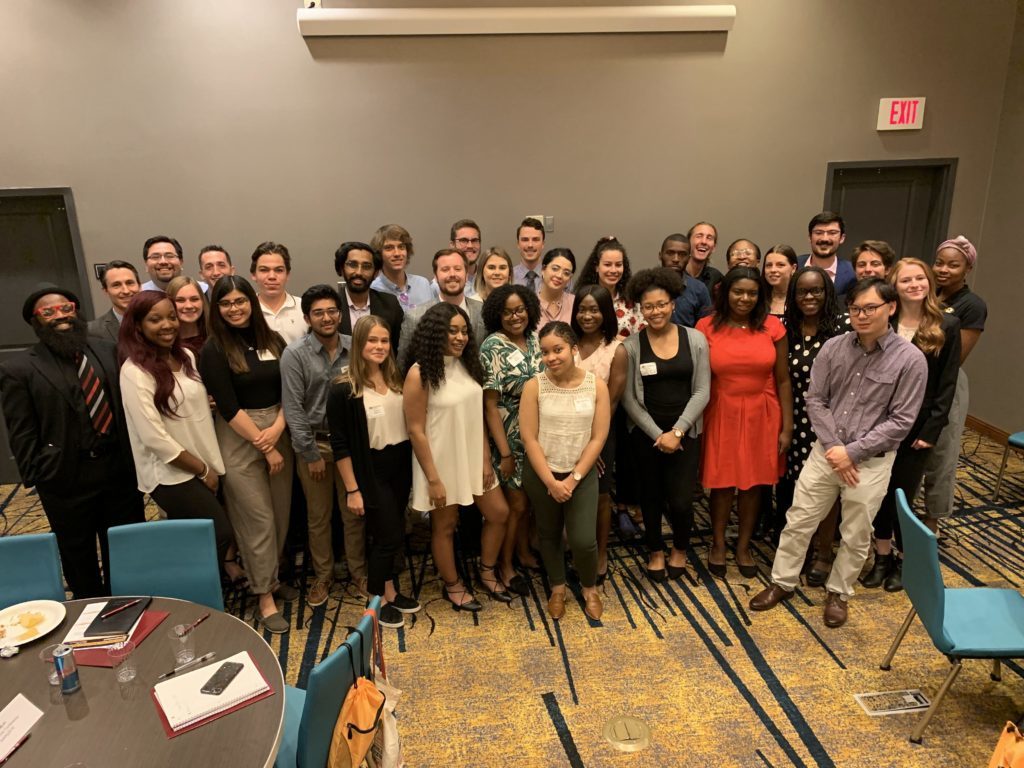APRIL SYMPOSIUM RACE AND THE AMERICAN STORY NOW OPEN TO THE PUBLIC ONLINE

Students from UMass, Arizona State University and the University of Missouri gather at the 2019 Race and the American Story Conference. Photo: Race and the American Story Project
SOURCE: UMass Office of News and Media Relations
As campuses nationwide responded to the global coronavirus crisis by canceling events and transitioning to remote learning, an important opportunity for students studying race and its significance in America to gather and connect at a symposium held at a historically significant location was off the table. Instead, faculty and staff from three institutions, including the University of Massachusetts Amherst, worked together to create an online “Zoomposium” to take place throughout the month of April, utilizing the remote video conference service called Zoom. They further decided to open the online event to the public as millions of Americans in isolation turn to the internet for connection, learning, and meaning.
The Race and the American Story Project is carried out by faculty from the University of Massachusetts Amherst, the University of Missouri, and Arizona State University. The project is a “national educational movement dedicated to cultivating conversation, fostering understanding, broadening knowledge, and building community among people of different backgrounds and walks of life in the U.S.,” according to the Race and the American Story website. It has its foundations in an undergraduate course, which is taught at all three institutions. Each year, the students and faculty involved in the course participate in a two-day immersive symposium held at a location of significance for the history of race in America. This year’s physical symposium, slated to be held at the National Civil Rights Museum in Memphis, was canceled as people nationwide moved into isolation to prevent the spread of COVID-19.
Stephanie Shonekan, UMass Amherst professor and chair of the W.E.B. Du Bois Department of Afro-American Studies, founded the project in 2015 with Adam Seagrave, associate professor and associate director of the School of Civic and Economic Thought and Leadership at Arizona State University, when the two worked together at the University of Missouri. In response to a student movement urging the administration and faculty to acknowledge and intervene in racist actions that were happening regularly on that campus, Shonekan and Seagrave were tapped to create a two-hour, mandatory training program called “Citizenship@Mizzou.” It was so popular that they decided to evolve it into a course.
When Shonekan and Seagrave both moved on from the University of Missouri in 2018, they made a pact to continue teaching the course at their new respective campuses and invited colleagues from the University of Missouri to continue teaching it there. “At first we thought we would just have our students meet online,” said Shonekan, “and then we decided that we would create a symposium where all our students could meet face to face and have really in-depth conversations about the readings and themes… We knew that Massachusetts, Arizona, and Missouri were very different politically and historically and that our students would have rich interactions and revelations as they learned about the different perspectives and worldviews of their counterparts in other institutions.”
“Adam and I worked really hard with his team at ASU to secure the National Civil Rights Museum in Memphis, Tenn. as our venue for this year’s symposium,” said Shonekan (the museum is built in and around the former Lorraine Motel, which was the site of the assassination of Martin Luther King Jr. on April 4, 1968). “We had planned to fly up to 80 students and faculty to Memphis from Missouri, Arizona, and Massachusetts,” Shonekan explains. But as news of the COVID-19 outbreak began to spread, they knew that the trip needed to be canceled, “much to the disappointment of all our students, faculty, and our guest speakers,” said Shonekan.
Working closely with Susan Kells, Program Coordinator at the School of Civic and Economic Thought at ASU, Shonekan and Seagrave worked quickly to move the symposium online and saw an opportunity to open it to the public. “Our intention and long-term vision has always been to open parts of the project to the public,” explains Shonekan. “When we realized that we could still proceed with the symposium in this new format, we thought it would be a great opportunity to open it up.”
Four open sessions will be held throughout the month of April on the following topics: Thomas Jefferson’s Story, Race and American Sports, Race and American Music, and The Story of the James Baldwin / William F. Buckley Jr. Debate. A full schedule with links to the sessions can be found on the Race and The American Story website.
Reflecting on how people all over the world in isolation seem to be turning to literature, history, music and art, and other ways to understand our shared human experience, Shonekan said, “If there is a silver lining in this incredibly difficult moment we are living through, it is that we have an opportunity to slow down and appreciate what we have taken for granted for so long—the gift of community and the value of communicating, of listening, of walking in the shoes of the other. The Race and the American Story symposium gives us an opportunity to contend with what ancestors went through, how ‘founding fathers,’ brave activists, and intellectual icons conceived of or contributed to the problems and solutions of society, and how these issues have endured to our present moment.”
Questions can be directed to:
Stephanie Shonekan, sshonekan@umass.edu, 413-545-2751
Shiera D. Goff, sdgoff@umass.edu, 413-362-9163
